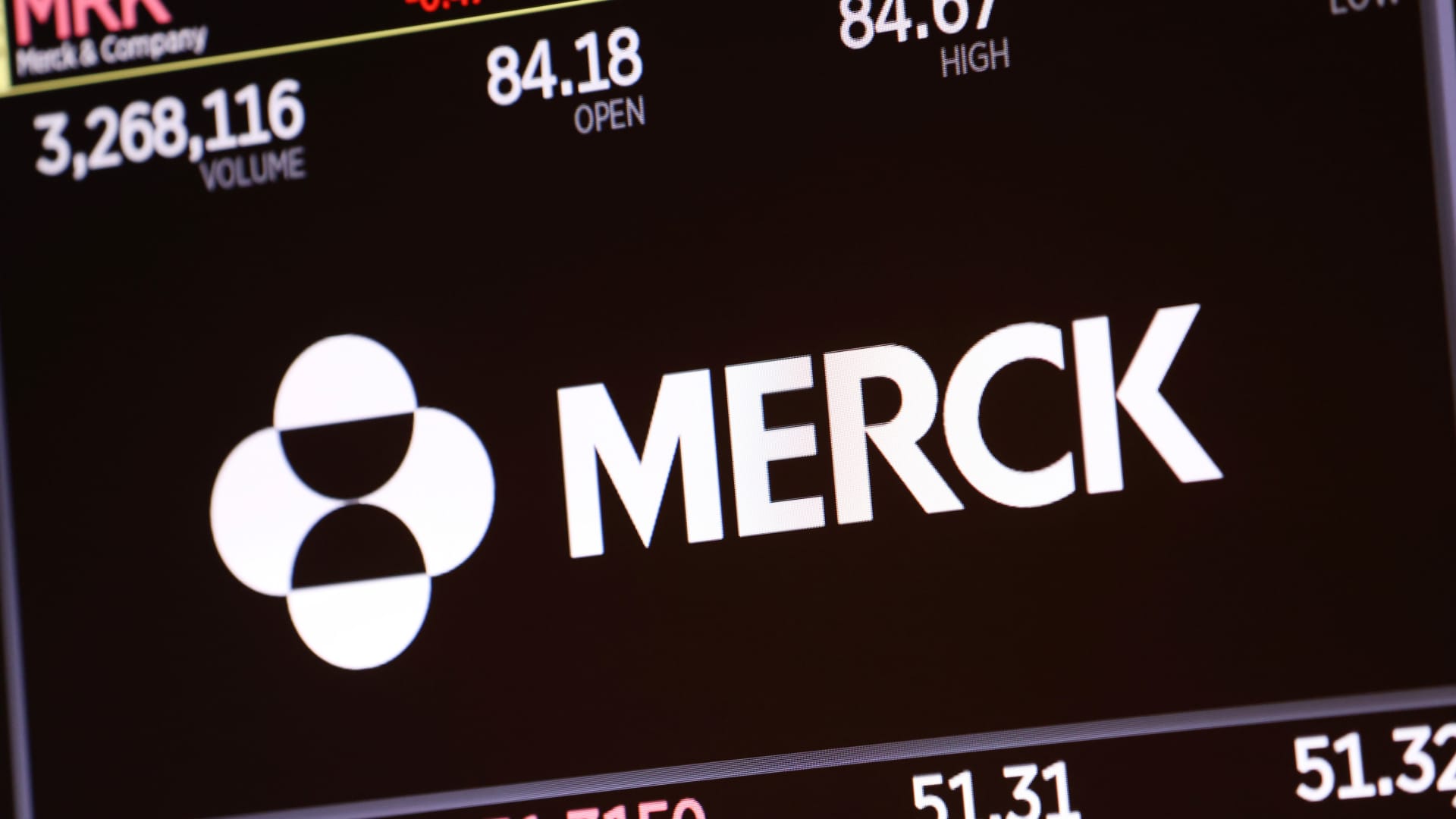Merck on Thursday reported fourth-quarter revenue and adjusted earnings that topped estimates as it saw strong demand for its blockbuster cancer drug Keytrudaand HPV vaccine Gardasil.
The pharmaceutical giant posted a net quarterly loss, however, due to previously announced charges associated with a deal the company struck in October with the Japanese drugmaker Daiichi Sankyo to co-develop three highly sought-after cancer treatments.
Here’s what Merck reported for the fourth quarter compared with what Wall Street was expecting, based on a survey of analysts by LSEG, formerly known as Refinitiv:
- Earnings per share: 3 cents adjusted vs. a loss of 11 cents per share expected
- Revenue: $14.63 billion vs. $14.50 billion expected
The company posted a net loss of $1.23 billion, or 48 cents per share, for the quarter. That compares to a net income of $3.02 billion, or $1.18 per share, during the year-earlier period.
Excluding acquisition and restructuring costs, Merck earned 3 cents per share for the fourth quarter. The company’s results include a charge of $1.69 per share related to the Daiichi Sankyo deal.
Merck raked in $14.63 billion in revenue for the quarter, up 6% from the same period a year ago.
Those results come as Merck shows significant progress in preparing for Keytruda’s patent expiration in 2028, with a handful of new deals under its belt and key drug launches ahead. The loss of exclusive rights to the drug will likely mean its sales will fall, forcing the company to draw revenue from elsewhere.
The company also issued its full-year 2024 guidance, which was generally in line with expectations. Merck expects revenue to come in between $62.7 billion and $64.2 billion and adjusted earnings to be $8.44 to $8.59 per share this year.
Analysts surveyed by LSEG expected Merck to forecast full-year sales of $63.52 billion and adjusted earnings of $8.42 per share.
That adjusted earnings outlook includes a one-time charge of roughly 26 cents per share related to Merck’s acquisition of Harpoon Therapeutics, which develops immune-based cancer drugs, earlier this month.
Merck also announced a new restructuring program for 2024, which aims to improve the manufacturing network of both its pharmaceutical division and animal health business. Merck recorded charges of $190 million related to the program in the fourth quarter, which is excluded from its adjusted results.
That brings Merck’s total restructuring charges for the period to $401 million. That number also includes charges from a restructuring program the company launched in 2019.
Pharmaceutical business posts growth
Merck’s pharmaceutical business, which develops a wide range of drugs for several disease areas, booked $13.14 billion in revenue during the quarter. That’s up 8% from the same period a year ago.
Merck’s immunotherapy Keytruda, which is used to treat several types of cancer, largely fueled the growth.
The drug booked $6.61 billion in revenue, up 21% from the year-earlier quarter. Analysts had been expecting $6.41 billion in Keytruda sales, according to estimates from FactSet.
Merck also saw a jump in sales of Gardasil, a vaccine that prevents cancer from HPV, the most common sexually transmitted infection in the U.S.
Gardasil raked in $1.87 billion in sales, up 27% from the fourth quarter of 2022. That’s slightly below the $1.92 billion that analysts were expecting, according to FactSet estimates.
Meanwhile, sales of its Covid antiviral pill Lagevrio fell to $193 million during the period, down 77% from the $825 million reported for the fourth quarter of 2022. Still, the drug blew past analysts’ expectations of $69 million in sales, according to FactSet.
That’s no surprise: Demand has plummeted for Lagevrio and other Covid products from companies such as Pfizer and Moderna over the last year, as cases and concern about the virus dwindled from their pandemic peaks.
Merck’s Type 2 diabetes treatment, Januvia, also saw sales fall to $787 million during the quarter, down 14% from the same period a year ago. The company said competition from cheaper generic drugs outside of the U.S., particularly in Europe, and lower demand in the U.S. cut into the sales.
That total still came in higher than analysts’ estimate of $732.3 million for the period, according to FactSet.
Januvia is one of ten drugs that will be subject to Medicare drug price negotiations, a policy under the Inflation Reduction Act that aims to make costly medications more affordable for seniors. Also on Thursday, Medicare is making initial price offers for each of those drugs.
Merck’s animal health division, which develops vaccines and medicines for dogs, cats and cattle, posted $1.28 billion in sales, up 4% from the same period a year ago.
The company said higher demand for companion animal products, such as the flea and tick treatment Bravecto, drove the increase.
Merck will hold a conference call at 9 a.m. ET on Thursday.
